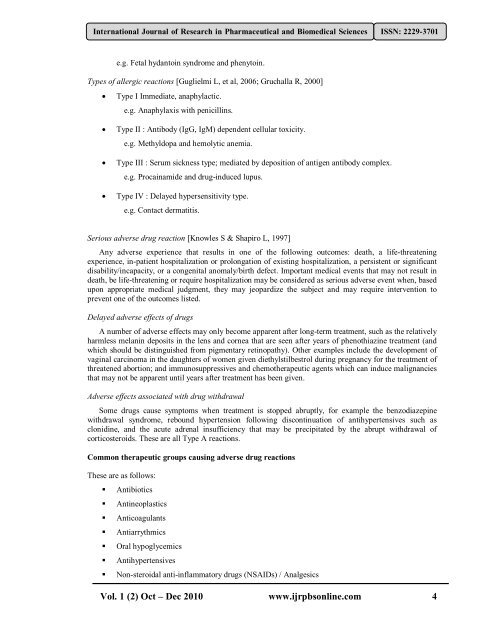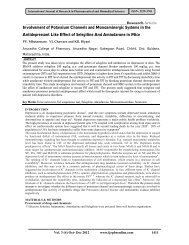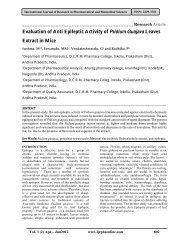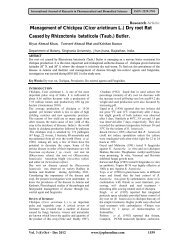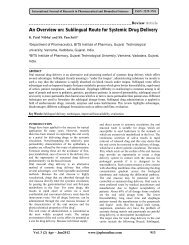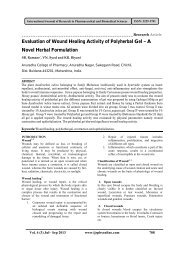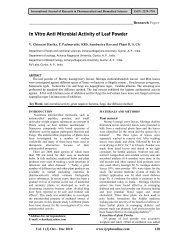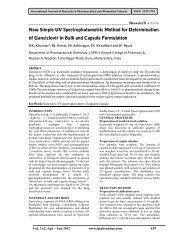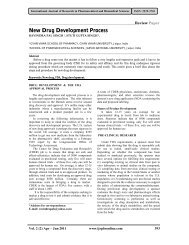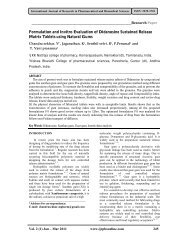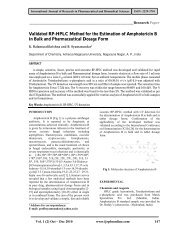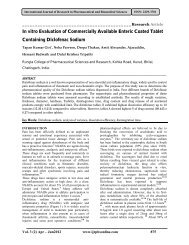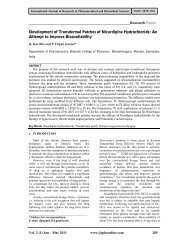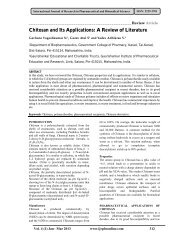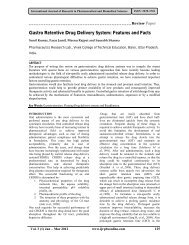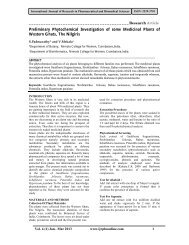Monitoring of Suspected Adverse Drug Reactions in Oncology Unit ...
Monitoring of Suspected Adverse Drug Reactions in Oncology Unit ...
Monitoring of Suspected Adverse Drug Reactions in Oncology Unit ...
Create successful ePaper yourself
Turn your PDF publications into a flip-book with our unique Google optimized e-Paper software.
International Journal <strong>of</strong> Research <strong>in</strong> Pharmaceutical and Biomedical Sciences ISSN: 2229-3701<br />
e.g. Fetal hydanto<strong>in</strong> syndrome and phenyto<strong>in</strong>.<br />
Types <strong>of</strong> allergic reactions [Guglielmi L, et al, 2006; Gruchalla R, 2000]<br />
Type I Immediate, anaphylactic.<br />
e.g. Anaphylaxis with penicill<strong>in</strong>s.<br />
<br />
<br />
<br />
Type II : Antibody (IgG, IgM) dependent cellular toxicity.<br />
e.g. Methyldopa and hemolytic anemia.<br />
Type III : Serum sickness type; mediated by deposition <strong>of</strong> antigen antibody complex.<br />
e.g. Proca<strong>in</strong>amide and drug-<strong>in</strong>duced lupus.<br />
Type IV : Delayed hypersensitivity type.<br />
e.g. Contact dermatitis.<br />
Serious adverse drug reaction [Knowles S & Shapiro L, 1997]<br />
Any adverse experience that results <strong>in</strong> one <strong>of</strong> the follow<strong>in</strong>g outcomes: death, a life-threaten<strong>in</strong>g<br />
experience, <strong>in</strong>-patient hospitalization or prolongation <strong>of</strong> exist<strong>in</strong>g hospitalization, a persistent or significant<br />
disability/<strong>in</strong>capacity, or a congenital anomaly/birth defect. Important medical events that may not result <strong>in</strong><br />
death, be life-threaten<strong>in</strong>g or require hospitalization may be considered as serious adverse event when, based<br />
upon appropriate medical judgment, they may jeopardize the subject and may require <strong>in</strong>tervention to<br />
prevent one <strong>of</strong> the outcomes listed.<br />
Delayed adverse effects <strong>of</strong> drugs<br />
A number <strong>of</strong> adverse effects may only become apparent after long-term treatment, such as the relatively<br />
harmless melan<strong>in</strong> deposits <strong>in</strong> the lens and cornea that are seen after years <strong>of</strong> phenothiaz<strong>in</strong>e treatment (and<br />
which should be dist<strong>in</strong>guished from pigmentary ret<strong>in</strong>opathy). Other examples <strong>in</strong>clude the development <strong>of</strong><br />
vag<strong>in</strong>al carc<strong>in</strong>oma <strong>in</strong> the daughters <strong>of</strong> women given diethylstilbestrol dur<strong>in</strong>g pregnancy for the treatment <strong>of</strong><br />
threatened abortion; and immunosuppressives and chemotherapeutic agents which can <strong>in</strong>duce malignancies<br />
that may not be apparent until years after treatment has been given.<br />
<strong>Adverse</strong> effects associated with drug withdrawal<br />
Some drugs cause symptoms when treatment is stopped abruptly, for example the benzodiazep<strong>in</strong>e<br />
withdrawal syndrome, rebound hypertension follow<strong>in</strong>g discont<strong>in</strong>uation <strong>of</strong> antihypertensives such as<br />
clonid<strong>in</strong>e, and the acute adrenal <strong>in</strong>sufficiency that may be precipitated by the abrupt withdrawal <strong>of</strong><br />
corticosteroids. These are all Type A reactions.<br />
Common therapeutic groups caus<strong>in</strong>g adverse drug reactions<br />
These are as follows:<br />
• Antibiotics<br />
• Ant<strong>in</strong>eoplastics<br />
• Anticoagulants<br />
• Antiarrythmics<br />
• Oral hypoglycemics<br />
• Antihypertensives<br />
• Non-steroidal anti-<strong>in</strong>flammatory drugs (NSAIDs) / Analgesics<br />
Vol. 1 (2) Oct – Dec 2010 www.ijrpbsonl<strong>in</strong>e.com 4


